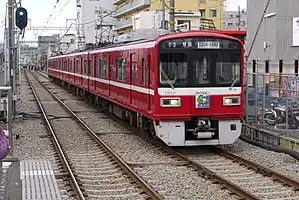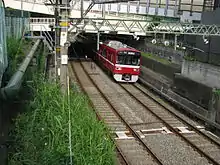Keikyū Daishi Line
The Keikyu Daishi Line (京急大師線, Keikyū Daishi-sen) is a 4.5 km (2.8 mi) railway line in Kanagawa Prefecture, Japan, operated by the private railway operator Keikyu. It connects Keikyu Kawasaki Station and Kojimashinden Station, both located in Kawasaki-ku, Kawasaki.
| Keikyu Daishi Line | |
|---|---|
| KK | |
 A 1500 series 4-car set at Higashi-Monzen Station in January 2012 | |
| Overview | |
| Native name | 京急大師線 |
| Owner | Keikyu |
| Locale | Kawasaki, Kanagawa |
| Termini | Keikyū Kawasaki Kojimashinden |
| Stations | 7 |
| Service | |
| Type | Commuter rail |
| History | |
| Opened | 21 January 1899 |
| Technical | |
| Line length | 4.5 km (2.8 mi) |
| Number of tracks | 2 |
| Track gauge | 1,435 mm (4 ft 8 1⁄2 in) |
| Electrification | 1,500 V DC, overhead catenary |
| Operating speed | 60 km/h (35 mph) |
Service patterns
Keikyu Daishi Line services are operated only by four-car electric multiple unit (EMU) trains, stopping at all stations between Keikyu Kawasaki and Kojimashinden. During the weekday off-peak, trains run at 10-minute intervals, increased to 5-minute intervals during the morning and evening peaks.
Stations
All stations are located in Kawasaki-ku, Kawasaki.
| No. | Station name | Japanese | Distance (km) | Transfers |
|---|---|---|---|---|
| KK20 | Keikyu Kawasaki | 京急川崎 | 0.0 | KK Keikyu Main Line |
| KK21 | Minatochō | 港町 | 1.2 | |
| KK22 | Suzukichō | 鈴木町 | 2.0 | |
| KK23 | Kawasaki-Daishi | 川崎大師 | 2.5 | |
| KK24 | Higashi-Monzen | 東門前 | 3.2 | |
| KK25 | Daishibashi | 大師橋 | 3.8 | |
| KK26 | Kojimashinden | 小島新田 | 4.5 |
Rolling stock
Services on the line are operated using four-car Keikyu 1500 series EMUs, but are occasionally operated by other types, including four-car Keikyu 600 series, or Keikyu N1000 series EMUs.[1][2]
History

The line was opened on 21 January 1899 by the Daishi Electric Railway (大師電気鉄道), as a standard gauge line electrified at 600 V DC, between Kawasaki Station (later renamed Rokugōbashi Station (六郷橋駅), which closed in 1949) and Daishi Station (later renamed Kawasaki-Daishi Station).[3] The company was renamed Keihin Electric Railway (京浜電気鉄道) on 25 April 1899.[3] The line was double-tracked over its entire length from 29 November the same year,[3] and extended from Rokugōbashi Station to the present-day Keikyu Kawasaki Station on 1 September 1902.[3]
The line was extended to Sakuramoto in 1945, and the overhead line voltage was raised from the original 600 V DC to 1,500 V DC on 16 March 1951 except for the Shiohama to Sakuramoto section, which was transferred to the Kawasaki Streetcar Co. and operated as a tramway.[3]
Originally, the line was built to transport the visitors of Kawasaki Daishi buddhist temple. But later, factory workers increased, as the east side of the temple became an industrial zone.
See also
References
- 京急600形が大師線内で運用される [Keikyu 600 series operated on Daishi Line]. Japan Railfan Magazine Online (in Japanese). Japan: Koyusha Co., Ltd. 13 June 2016. Archived from the original on 13 June 2016. Retrieved 13 June 2016.
- 京急 新1000形が大師線運用に [Keikyu New 1000 series operated on Daishi Line]. Japan Railfan Magazine Online (in Japanese). Japan: Koyusha Co., Ltd. 9 January 2008. Archived from the original on 25 October 2017. Retrieved 25 October 2017.
- Terada, Hirokazu (19 January 2013). データブック日本の私鉄 [Databook: Japan's Private Railways]. Japan: Neko Publishing. p. 232. ISBN 978-4-7770-1336-4.
External links
| Wikimedia Commons has media related to Keikyū Daishi Line. |
- Keikyu route information (in Japanese)